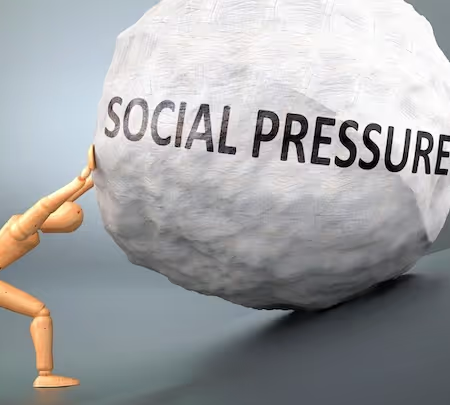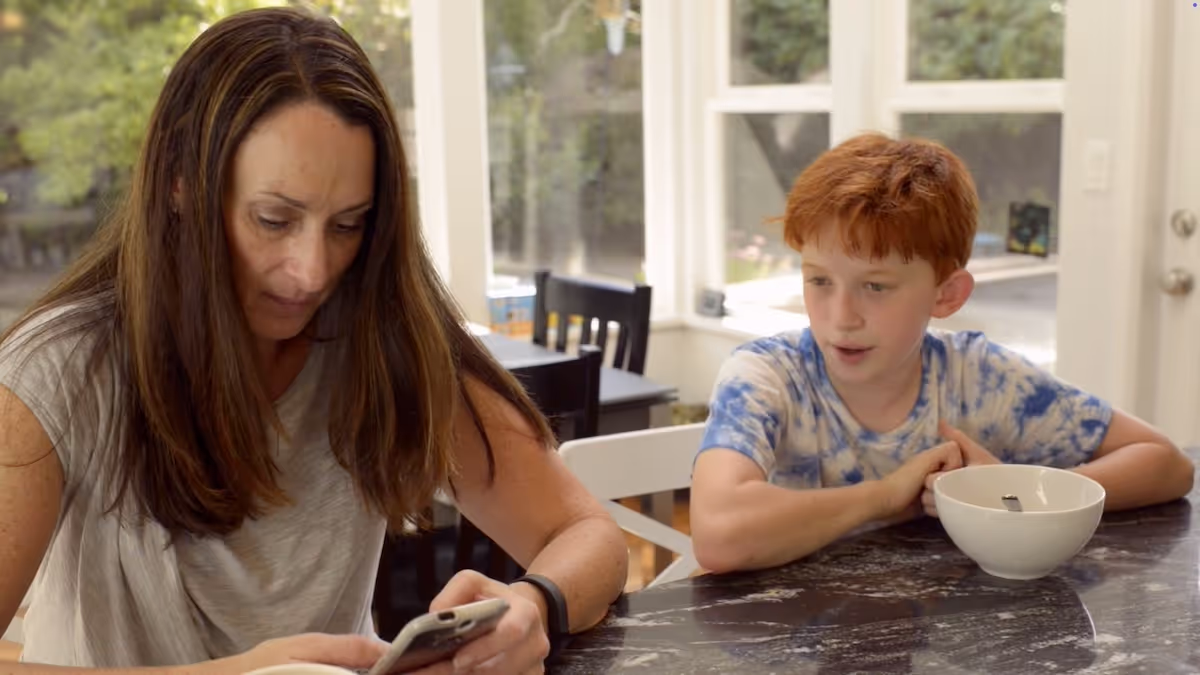


In author David Foster Wallace’s 2005 commencement speech at Kenyon College, he shared the following parable:
“There are these two young fish swimming along and they happen to meet an older fish swimming the other way who nods at them and says, “Morning, boys. How’s the water?” And the two young fish swim on for a bit, and then eventually, one of them looks over at the other and goes, “What the hell is water?”
Wallace said, “The point of the fish story is merely that the most obvious, important realities are often the ones that are hardest to see and talk about.”
I have often thought this parable relates to the social pressures that teens are submerged in online and offline. Just like the fish, they often don’t realize it. Pressures such as: Should I be wearing this brand? Should I try those skateboard tricks I saw on YouTube? Should I try vaping?
Throughout my kids’ school careers, I’ve always reminded them, “You are steeped in social pressures, and there is no way you can fully appreciate the weight of them until you get to the other side. Social pressures never completely disappear, but they lessen greatly after your schooling days.”
I’ve explained to them how revelatory it was for me when I left college and started working as a research assistant in a lab at the National Institute of Health in Washington D.C. I went from being a little fish clueless about the vast water around me to this older fish seeing the water clearly now.
Learn more about showing our movies in your school or community!
Join Screenagers filmmaker Delaney Ruston MD for our latest Podcast

Learn more about our Screen-Free Sleep campaign at the website!
Our movie made for parents and educators of younger kids
Learn more about showing our movies in your school or community!
I had a new awareness of all the social pressures I experienced as a student. Under my now-conscious radar, feelings and insecurities about who my true friends were or how I should act around certain people didn’t matter as much to me anymore.
These weren’t thoughts that ruled my days, but were molecules that made up the air that I moved in and added pressure that I was not even aware of most of the time.
I felt gleeful after leaving college and stepping into a lab full of seasoned scientists, post-docs and recent grads like me. I felt the same in the health clinic.
Becoming that “older fish” from Foster’s speech was freeing. Do you recall times when you suddenly felt free from insidious social pressure as an adult?
My kids have told me that my reminders of the water they are swimming in helped them at times.
Learn more about showing our movies in your school or community!
Join Screenagers filmmaker Delaney Ruston MD for our latest Podcast

Learn more about our Screen-Free Sleep campaign at the website!
Our movie made for parents and educators of younger kids
Join Screenagers filmmaker Delaney Ruston MD for our latest Podcast
As we’re about to celebrate 10 years of Screenagers, we want to hear what’s been most helpful and what you’d like to see next.
Please click here to share your thoughts with us in our community survey. It only takes 5–10 minutes, and everyone who completes it will be entered to win one of five $50 Amazon vouchers.
In author David Foster Wallace’s 2005 commencement speech at Kenyon College, he shared the following parable:
“There are these two young fish swimming along and they happen to meet an older fish swimming the other way who nods at them and says, “Morning, boys. How’s the water?” And the two young fish swim on for a bit, and then eventually, one of them looks over at the other and goes, “What the hell is water?”
Wallace said, “The point of the fish story is merely that the most obvious, important realities are often the ones that are hardest to see and talk about.”
I have often thought this parable relates to the social pressures that teens are submerged in online and offline. Just like the fish, they often don’t realize it. Pressures such as: Should I be wearing this brand? Should I try those skateboard tricks I saw on YouTube? Should I try vaping?
Throughout my kids’ school careers, I’ve always reminded them, “You are steeped in social pressures, and there is no way you can fully appreciate the weight of them until you get to the other side. Social pressures never completely disappear, but they lessen greatly after your schooling days.”
I’ve explained to them how revelatory it was for me when I left college and started working as a research assistant in a lab at the National Institute of Health in Washington D.C. I went from being a little fish clueless about the vast water around me to this older fish seeing the water clearly now.
I had a new awareness of all the social pressures I experienced as a student. Under my now-conscious radar, feelings and insecurities about who my true friends were or how I should act around certain people didn’t matter as much to me anymore.
These weren’t thoughts that ruled my days, but were molecules that made up the air that I moved in and added pressure that I was not even aware of most of the time.
I felt gleeful after leaving college and stepping into a lab full of seasoned scientists, post-docs and recent grads like me. I felt the same in the health clinic.
Becoming that “older fish” from Foster’s speech was freeing. Do you recall times when you suddenly felt free from insidious social pressure as an adult?
My kids have told me that my reminders of the water they are swimming in helped them at times.
Sign up here to receive the weekly Tech Talk Tuesdays newsletter from Screenagers filmmaker Delaney Ruston MD.
We respect your privacy.
In author David Foster Wallace’s 2005 commencement speech at Kenyon College, he shared the following parable:
“There are these two young fish swimming along and they happen to meet an older fish swimming the other way who nods at them and says, “Morning, boys. How’s the water?” And the two young fish swim on for a bit, and then eventually, one of them looks over at the other and goes, “What the hell is water?”
Wallace said, “The point of the fish story is merely that the most obvious, important realities are often the ones that are hardest to see and talk about.”
I have often thought this parable relates to the social pressures that teens are submerged in online and offline. Just like the fish, they often don’t realize it. Pressures such as: Should I be wearing this brand? Should I try those skateboard tricks I saw on YouTube? Should I try vaping?
Throughout my kids’ school careers, I’ve always reminded them, “You are steeped in social pressures, and there is no way you can fully appreciate the weight of them until you get to the other side. Social pressures never completely disappear, but they lessen greatly after your schooling days.”
I’ve explained to them how revelatory it was for me when I left college and started working as a research assistant in a lab at the National Institute of Health in Washington D.C. I went from being a little fish clueless about the vast water around me to this older fish seeing the water clearly now.

Thoughtful family tech rules help protect kids’ wellbeing, learning, and sleep while strengthening connection at home. Using the fresh start of a new year, this post shares eight practical tech habits families can discuss and adapt together, including shared social media check-ins, screen time inventories, device-free meals, regular gaming breaks, and keeping phones out of bedrooms at night.
READ MORE >
Psychologist Jean Twenge explains how parental controls can support healthier tech use by protecting sleep, limiting late night device access, and reducing kids’ exposure to content they are not developmentally ready to handle. She discusses why third party parental control tools are often more effective and easier to use than built in options, while acknowledging that no system is perfect. Clear boundaries, combined with technology based limits, can reduce ongoing conflict and make screen time rules easier to enforce.
READ MORE >
for more like this, DR. DELANEY RUSTON'S NEW BOOK, PARENTING IN THE SCREEN AGE, IS THE DEFINITIVE GUIDE FOR TODAY’S PARENTS. WITH INSIGHTS ON SCREEN TIME FROM RESEARCHERS, INPUT FROM KIDS & TEENS, THIS BOOK IS PACKED WITH SOLUTIONS FOR HOW TO START AND SUSTAIN PRODUCTIVE FAMILY TALKS ABOUT TECHNOLOGY AND IT’S IMPACT ON OUR MENTAL WELLBEING.
